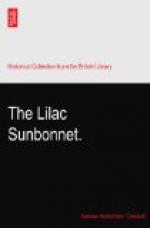The thought made his heart tender. To his father he said:
“Father, will you not take my word that there is nothing wicked or disgraceful in what I have done? If it were my own secret, I would gladly tell you at once; but as it is, I must wait until in his own time Mr. Welsh communicates with you.”
The minister, sitting in the Reformer’s seat, pulling at his stern upper lip, winced; and perhaps had it not been for the pulpit the human in him might have triumphed. But he only said:
“I am quite prepared to support you until such time as at a meeting of the presbytery the matter be tried, but I cannot have in a Marrow Manse one living under the fama of expulsion from the house of a brother minister in good standing.”
“Thank you, father,” said his son, “for your kind offer, but I do not think I shall need to trouble you.”
And so with these words the young man turned and went out proudly from the father’s sight, as he had gone from the manse of the other minister of the Marrow kirk.
As he came to the outside of the door, leaving his father sitting stately and stern in the Reformer’s pulpit, he said, in the deeps of his heart:
“God do so to me, and more also, if I ever seek again to enter the Marrow kirk, if so be that, like my father, I must forget my humanity in order worthily to serve it!”
After he had gone out, the Reverend Gilbert Peden took his Bible and read the parable of the prodigal son. He closed the great book, which ever lay open before him, and said, as one who both accuses and excuses himself:
“But the prodigal son was not under trials for license in the kirk of the Marrow!”
At the door, John Bairdieson, his hair more than ever on end, met Ralph. He held up his hands.
“It’s an awfu’—like thing to be obleegit to tell the hale truth! O man, couldna ye hae tell’t a wee bit lee? It wad hae saved an awfu’ deal o’ fash! But it’s ower late now; ye can juist bide i’ the spare room up the stair, an’ come an’ gang by door on the Castle Bank, an’ no yin forbye mysel’ ’ill be a hair the wiser. I, John Bairdieson, ’ll juist fetch up yer meals the same as ordinar’. Ye’ll be like a laddie at the mastheid up there; it’ll be braw an’ quate for the studyin’!”
“John, I am much obliged to you for your kind thought,” said Ralph, “but I cannot remain in his house against my father’s expressed wish, and without his knowledge.”
“Hear till him! Whaur else should he bide but in the hoose that he was born in, an’ his faither afore him? That would be a bonny like story. Na, na, ye’ll juist bide, Maister Ralph, an’—”
“I must go this very night,” said Ralph. “You mean well, John, but it cannot be. I am going down to see my uncle, Professor Thriepneuk.”
“Leave yer faither’s hoose to gang to that o’ a weezened auld—”
“John!” said Ralph, warningly.
“He’s nae uncle o’ yours, onygate, though he married your mother’s sister. An’ a sair life o’t she had wi’ him, though I doot na but thae dochters o’ his sort him to richts noo.”




